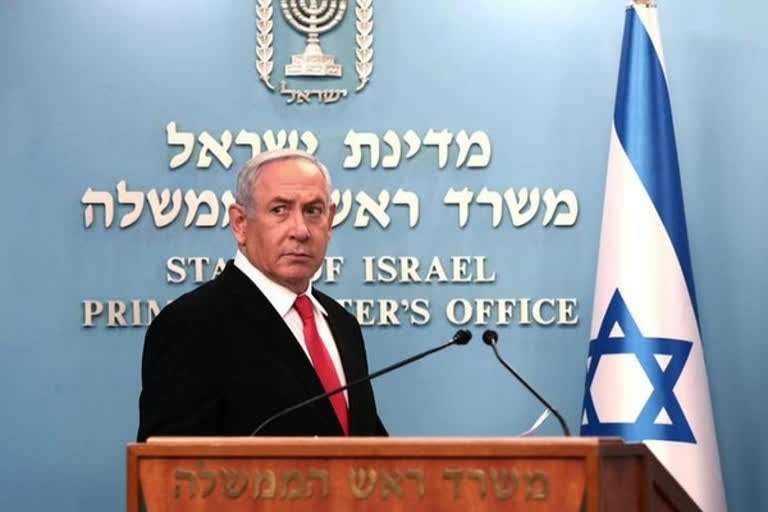Nicosia [Cyprus]: The Israeli Parliament dissolved last week after the deadline to approve the budget for 2020 expired.
As a result, the so-called "unity government" formed just seven months ago after a coalition between Prime Minister Benjamin Netanyahu, leader of the conservative Likud Party, and Defense Minister Benny Gantz, leader of the centrist Blue and White Party, was disbanded.
Netanyahu presented a budget for the current year, while Gantz wanted a budget to cover 2020 and 2021.
Apparently, Netanyahu did not want to honour the power-sharing agreement he had signed with Gantz earlier this year which envisaged that Netanyahu would be Prime Minister for the first 18 months and then Gantz would take over.
As there would be no approved budget for 2021, Gantz would be facing instability next November, when he was supposed to succeed Netanyahu as prime minister.
So it was clear to him that Netanyahu, as he did many times in his long political life, would not keep his promise and there would be no rotation in the post of Prime Minister.
Gantz wrote on the social media: "Netanyahu is taking us to an election for the sole purpose of not going to jail." But the question is why did Netanyahu cause the collapse of the coalition government? The most probable explanation is that Netanyahu wants to form a new right-wing and religious government that would give him immunity from prosecution.
Attorney General Avichai Mendelblit had announced on November 19 that Benjamin Netanyahu would be charged with bribery, fraud and breach of trust in three corruption cases and so would become the first sitting Prime Minister who is accused of bribery.
The bribery trial is scheduled to start next February.
Read: Moroccan King, Israeli PM have first phone conversation since normalisation decision
The first case (dubbed as case 4000) involves an alleged bribery deal between Netanyahu, as communication minister at the time, and Shaul Elovich, the tycoon owner of the Bezeq telecommunications company and the Walla news site.
Netanyahu allegedly took regulatory steps which brought gains amounting to USD 500 million to Elovich, who in turn gave favourable coverage to Netanyahu in the Walla news site.
The Prime Minister's lawyers say that favourable coverage does not constitute a bribe.
In the second case (Case 2000) Netanyahu had a number of meetings with Arnon Moses, the publisher of the daily newspaper Yedioth Ahronoth, which would allegedly lead to a deal in which Netanyahu would limit the circulation of a rival newspaper and get in return favourable coverage. The lawyers of Netanyahu insist that he could not be accused of an offence "because there are no indications that he planned to complete the deal."
The third case (case 1000) involves expensive gifts improperly received from Hollywood Mogul Arnon Milchan and billionaire James Packer over a course of several years.
The Prime Minister's lawyers respond that "he is allowed to receive gifts from friends." Netanyahu described the indictment of the Attorney General Mendelblit as "an attempted coup" aimed at toppling him, while Mendelblit said that he took the decision to charge Netanyahu "with a heavy heart" and that the investigations were based on broad-based evidence and testimony and were professionally reviewed.
Netanyahu denies any wrongdoing and insists that he is the victim of a politically motivated "witch hunt".
With the dissolution of the Knesset, Israel is going to hold its fourth election in just two years and what is worse is that the political turmoil is happening at a time when the country is facing the pandemic, while a large percentage of Israelis believe that the government did not take adequate measures to face the spread of COVID-19.
Anti-Netanyahu protesters have rallied across Israel for more than 26 straight weeks of mass demonstrations against the Prime Minister over his indictment on graft charges and for mishandling of the COVID-19 pandemic.
It should be said that Netanyahu, so far had been very lucky because, thanks to US President Donald Trump, the Jewish state achieved some of its long-term goals, like the recognition by the US of Jerusalem as Israel's capital and the establishment of diplomatic ties with the United Arab Emirates, Bahrain, Sudan and Morocco.
Netanyahu presented this as a personal political triumph. This time, however, things have changed. Donald Trump will not be the US President after January and will be replaced by President-elect Joe Biden, who is expected to seek to undo much of what Trump has done on the issue of Palestinians and will certainly make an effort to engage with Iran.
Reuven Hazan, the political scientist at Jerusalem University, says that with Biden at the helm of US, Netanyahu will lose a big campaign asset. And it is not only that.
This time Netanyahu's party has been greatly weakened as a prominent Likud politician Gideon Sa'ar quit Likud and formed a new party called "New Hope". A few days later, top Likud figure Zeev Elkin, who served Minister of Higher Education and Minister of Water Resources, joined the new party, which is expected to attract about 15 members of the Knesset and present a big challenge to Netanyahu.
This may mean that Netanyahu's 12-year stint as Israel's Prime Minister may come to an end.
ANI Report



